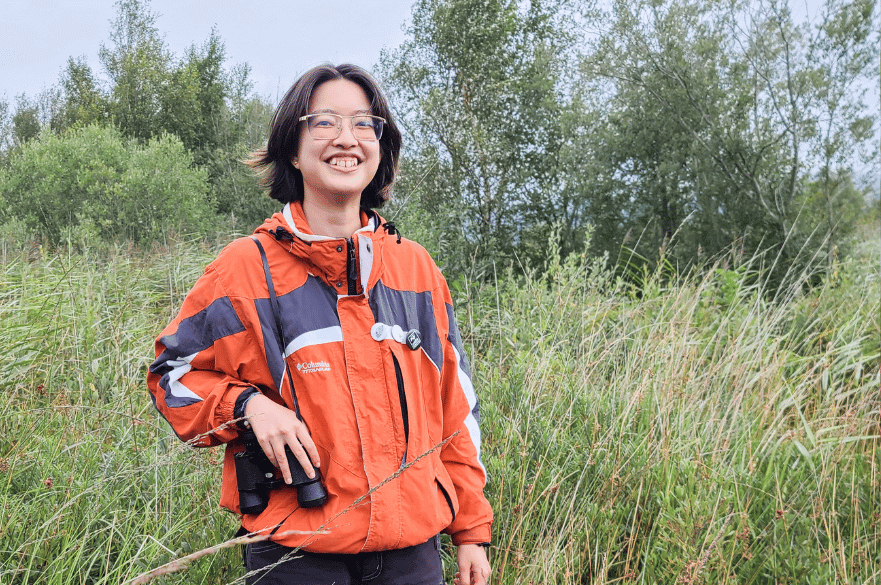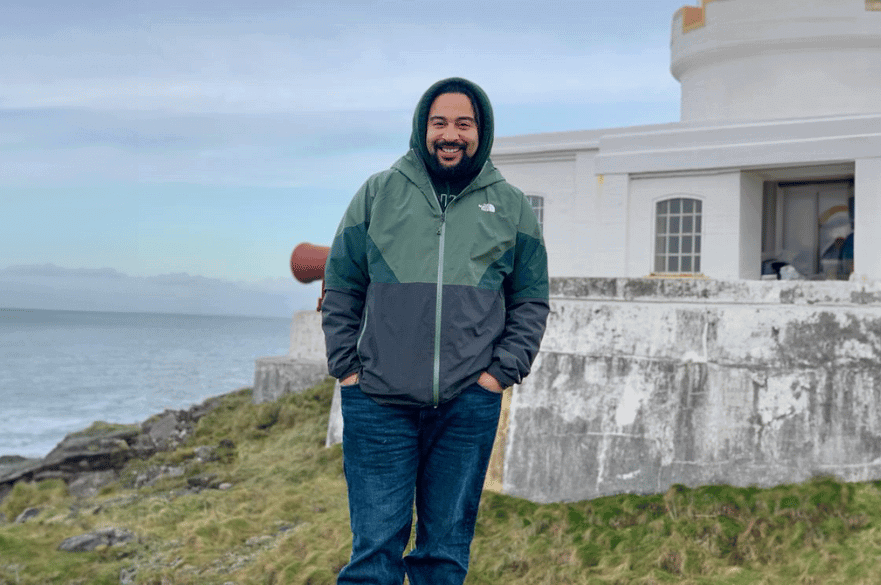
I like how diverse my modules are; I feel as though every facet of ecology has been covered, and we can all expand on fields we find interest in.
More about Thea
Why did you choose to study your course at NTU?
The ecology course at NTU felt like one that matched my goals and interests, focusing on employability and giving you the experience needed for jobs in the industry. Technical modules like practical conservation skills and environmental monitoring, or field courses to Spain and Wales have equipped me with useful research and habitat management skills. After gaining perspective from interacting with people in the conservation industry, this course at NTU is uniquely UK-centric, which other courses do not have, which can be useful for students that want to continue working in the UK after graduating.
What do you enjoy most about your course?
I love having the opportunity to build up my foundation of ecological knowledge, taking advantage of having the freedom to learn while I can. The environment my lecturers create promotes independent and critical thinking, which has taught me to interpret and retain information effectively. Especially now when I feel more confident in my research skills, having the chance to produce a dissertation on a topic I am passionate about makes me excited for my future career; I cannot wait to come into my own and contribute to the world’s knowledge.
How do you find your modules and what have you most enjoyed studying?
I like how diverse my modules are; I feel as though every facet of ecology has been covered, and we can all expand on fields we find interest in. For example, I chose the UK field course over the South Africa field course for marine ecology survey skills and knowledge. Personally, I enjoy the theory-based modules more, like Principles of Ecology, Land-Use Ecology, and Ecosystem Ecology, as they give me an insight into the complexity of ecology and the ‘why’ of everything.
What do you think about the facilities available on your course and what do you use the most?
I use the library facilities the most - there’s a variety of spaces here depending on your need. Whether you need a group space for stressing over assignments together, a quiet space to keep your head down and work, or powerful computers for tough computing tasks, it can provide. It also offers guidance in Library Student Mentors and Academic tutors, so no student can be left behind.
What do you think about Brackenhurst Campus? What do you get up to in your spare time?
I think Brackenhurst Campus is perfect for the outdoorsy person. There will always be a quiet place in nature on Brack if needed. Every time I need to clear my head I’ll go on a walk through the fields, into the dumble, sometimes to Sheep Walks Pond. Also, I go bouldering in the city 2 times a week to stay active and find community.
What is your top tip for someone considering studying/ living at Brackenhurst Campus?
My top tip, though obvious, is to join societies. I learnt this too late, only joining now in my final year, but it gives me a reason to socialise and keep healthy, especially when I am stressed about completing assignments. You can have a full day of studying, then reward yourself with fun at the end of the day. Without something to pull me out of the study grind, I’ll burn myself out.
Have you been involved in any placements, work experience or volunteering as part of your course? If so, what company did you do it for, what was your role/responsibilities and what did you achieve?
I did a placement with Radnorshire Wildlife Trust as a Data Management and Habitat Mapping trainee. I was in charge of the digitisation, mapping, and reporting of survey data of the Wilder Pentwyn project, a farm owned by Radnorshire Wildlife Trust that is in its early stages of rewilding. Thus, setting up monitoring programmes at Pentwyn required me to map out survey transects and/or conduct surveys like:
- Breeding and Winter bird surveys
- Botanical surveys
- Grazing impact surveys
- Hedgerow surveys
- Bumblebee and Butterfly surveys
I also assisted the reserves team with habitat management work parties by being a designated first-aider, managing volunteers, and carrying out management tasks such as:
- Fencing
- Tool maintenance
- Tree planting
- Bracken bashing
- Meadow management
- Invasive spp. Management
My most notable contribution to RWT was a UKHab classification of Pentwyn farm. I surveyed the site over the months and mapped it out on ArcGIS from scratch, developing my botany skills along the way.
If you completed a placement, would you recommend completing one and why?
I think it is very beneficial to have a placement or two under your belt, as it gives you perspective that university courses cannot provide. Talking to people who have been working in conservation for longer than imaginable was so eye-opening for me. I learnt about so many different perspectives and stakeholders I hadn’t considered when dealing with conservation efforts in practice. Additionally, I can prove I can manage myself and work well in small teams to future employers, as well as more technical qualifications like outdoor first aid training.
Why would you recommend your course to someone considering studying it?
I think the strength of this course is the support from employability; having help with CVs and applications is very useful, as well as fostering an awareness of personal strengths and weaknesses allow for the betterment of ourselves for future careers.
What are your plans for after the course and how do you feel your course has/ will help you to achieve that goal?
I want to go into research in ecology, so I’m pursuing further study. I have all the support I need from employability and my personal tutor with applications and personal development.
Still need help?
-

STUDENT PROFILE
Ajay Tegala
Ecology and ConservationUnited Kingdom
https://www.ntu.ac.uk/study-and-courses/courses/our-students-stories/animal-rural-environmental-sciences/ajay-tegala
-

STUDENT PROFILE
Ajay Uniyal
Food Science and TechnologyIndia
https://www.ntu.ac.uk/study-and-courses/courses/our-students-stories/animal-rural-environmental-sciences/ajay-uniyal
-

STUDENT PROFILE
Bejohn Quigley
Ecology and ConservationUnited Kingdom
https://www.ntu.ac.uk/study-and-courses/courses/our-students-stories/animal-rural-environmental-sciences/bejohn-quigley